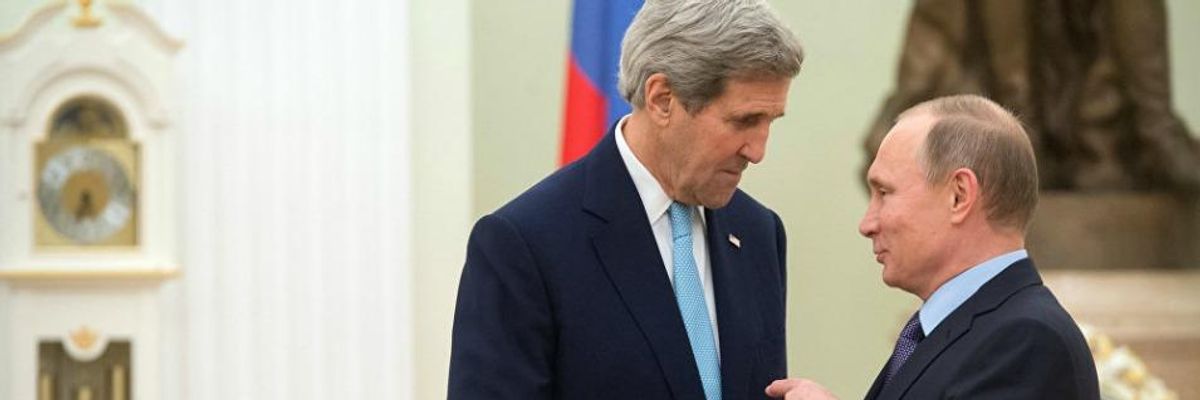
"The United States and our partners are not seeking so-called regime change," U.S. Secretary of State John Kerry told reporters in Moscow. (Photo: Sergey Guneev/Sputnik News)
To donate by check, phone, or other method, see our More Ways to Give page.

"The United States and our partners are not seeking so-called regime change," U.S. Secretary of State John Kerry told reporters in Moscow. (Photo: Sergey Guneev/Sputnik News)
U.S. Secretary of State John Kerry emerged from talks with Russian President Vladimir Putin on Tuesday and announced a new stance on the future of Syrian President Bashar al-Assad: He can stay--at least, for now.
"The United States and our partners are not seeking so-called regime change," Kerry told reporters in Moscow after the meeting.
The statement represented a distinct turnaround from the Obama administration's previous position that Assad should step--or be forced--aside while the international community proceeded with the bombing of his country.
Russia has maintained that Assad must be included in international negotiations, and that the matter of his departure was one the Syrian people should decide.
On Tuesday, Kerry said the focus now is "not on our differences about what can or cannot be done immediately about Assad." Rather, he claimed, it is on facilitating a process in which "Syrians will be making decisions for the future of Syria."
Despite this, Russia's Foreign Ministry spokesperson Maria Zakharova told reporters that key differences still remain, including, according to AP, "which rebel groups in Syria should be allowed to participate in the transition process and which should be deemed terrorists, and like the Islamic State group and al-Qaida, combatted by all."
Appearing alongside Russian Foreign Minister Sergey Lavrov, Kerry also announced that an international conference on the Syrian conflict would take place in New York later this week.
Donald Trump’s attacks on democracy, justice, and a free press are escalating — putting everything we stand for at risk. We believe a better world is possible, but we can’t get there without your support. Common Dreams stands apart. We answer only to you — our readers, activists, and changemakers — not to billionaires or corporations. Our independence allows us to cover the vital stories that others won’t, spotlighting movements for peace, equality, and human rights. Right now, our work faces unprecedented challenges. Misinformation is spreading, journalists are under attack, and financial pressures are mounting. As a reader-supported, nonprofit newsroom, your support is crucial to keep this journalism alive. Whatever you can give — $10, $25, or $100 — helps us stay strong and responsive when the world needs us most. Together, we’ll continue to build the independent, courageous journalism our movement relies on. Thank you for being part of this community. |
U.S. Secretary of State John Kerry emerged from talks with Russian President Vladimir Putin on Tuesday and announced a new stance on the future of Syrian President Bashar al-Assad: He can stay--at least, for now.
"The United States and our partners are not seeking so-called regime change," Kerry told reporters in Moscow after the meeting.
The statement represented a distinct turnaround from the Obama administration's previous position that Assad should step--or be forced--aside while the international community proceeded with the bombing of his country.
Russia has maintained that Assad must be included in international negotiations, and that the matter of his departure was one the Syrian people should decide.
On Tuesday, Kerry said the focus now is "not on our differences about what can or cannot be done immediately about Assad." Rather, he claimed, it is on facilitating a process in which "Syrians will be making decisions for the future of Syria."
Despite this, Russia's Foreign Ministry spokesperson Maria Zakharova told reporters that key differences still remain, including, according to AP, "which rebel groups in Syria should be allowed to participate in the transition process and which should be deemed terrorists, and like the Islamic State group and al-Qaida, combatted by all."
Appearing alongside Russian Foreign Minister Sergey Lavrov, Kerry also announced that an international conference on the Syrian conflict would take place in New York later this week.
U.S. Secretary of State John Kerry emerged from talks with Russian President Vladimir Putin on Tuesday and announced a new stance on the future of Syrian President Bashar al-Assad: He can stay--at least, for now.
"The United States and our partners are not seeking so-called regime change," Kerry told reporters in Moscow after the meeting.
The statement represented a distinct turnaround from the Obama administration's previous position that Assad should step--or be forced--aside while the international community proceeded with the bombing of his country.
Russia has maintained that Assad must be included in international negotiations, and that the matter of his departure was one the Syrian people should decide.
On Tuesday, Kerry said the focus now is "not on our differences about what can or cannot be done immediately about Assad." Rather, he claimed, it is on facilitating a process in which "Syrians will be making decisions for the future of Syria."
Despite this, Russia's Foreign Ministry spokesperson Maria Zakharova told reporters that key differences still remain, including, according to AP, "which rebel groups in Syria should be allowed to participate in the transition process and which should be deemed terrorists, and like the Islamic State group and al-Qaida, combatted by all."
Appearing alongside Russian Foreign Minister Sergey Lavrov, Kerry also announced that an international conference on the Syrian conflict would take place in New York later this week.